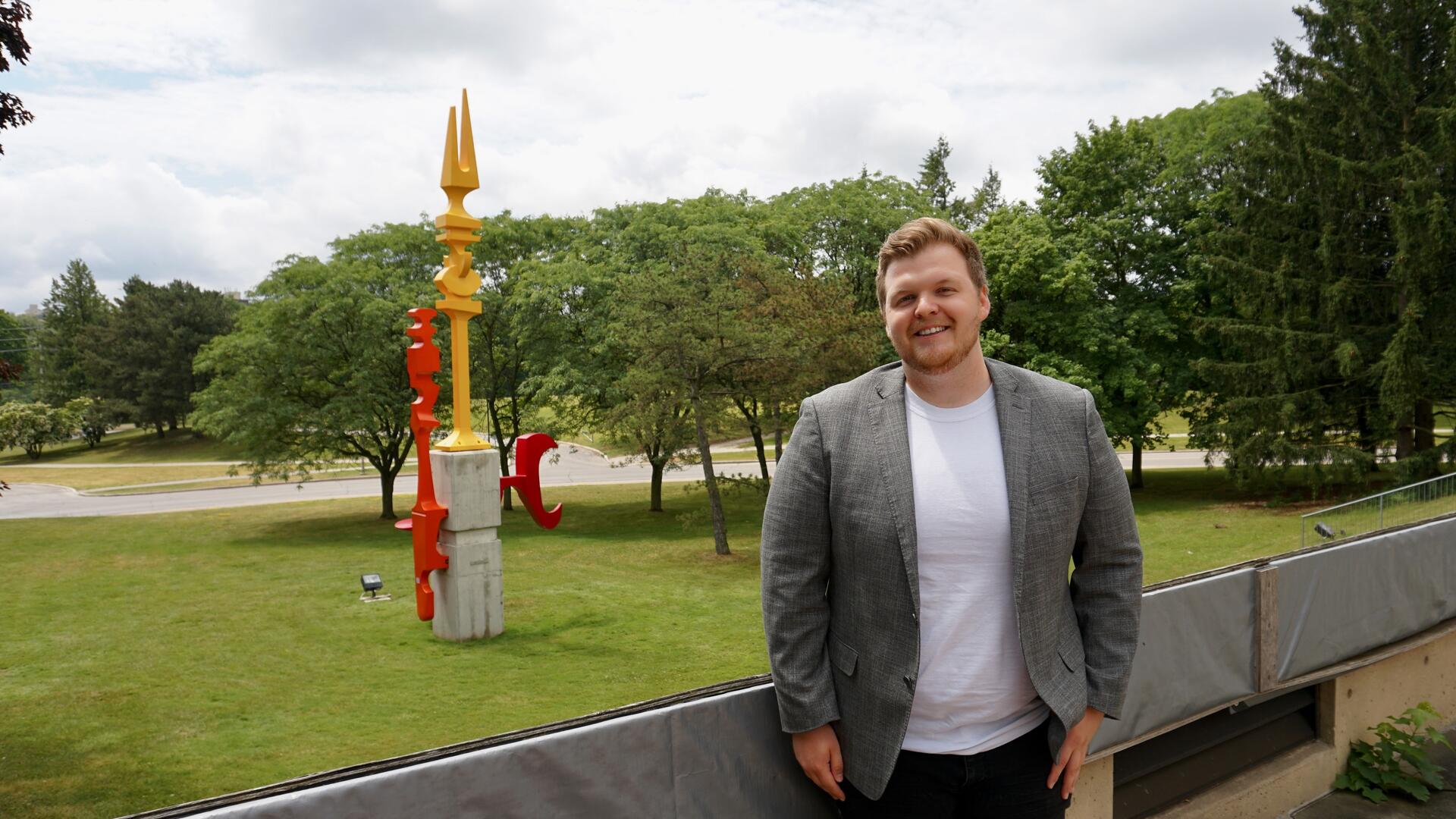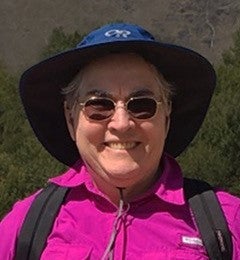- Ontario proclaims Day of Mourning on September 19
- Provide feedback on Waterloo's proposed Sustainable Land Care Standard
- Actions speak louder than words when it comes to memory
- David Sprott Distinguished Lecture set for September 22
- Schulich Leader Jonathan Zhou advances to semi-final in Breakthrough Junior Challenge
- Wednesday's notes
Editor:
Brandon Sweet
University Communications
bulletin@uwaterloo.ca
Ontario proclaims Day of Mourning on September 19
Yesterday, Prime Minister Justin Trudeau announced that Monday, September 19, the day of Queen Elizabeth II’s funeral at Westminster Abbey in London, will be a federal holiday and a National Day of Mourning.
Ontario Premier Doug Ford also announced that in lieu of a provincial holiday, Ontario will mark Monday as a Provincial Day of Mourning.
“This will give all Ontarians an opportunity to reflect on the remarkable life of Queen Elizabeth II and her unrelenting commitment to service and duty,” the premier’s statement says. “It also allows students to be in school learning about the many contributions the Queen made to the people of Ontario, Canada, and the entire Commonwealth, as well as the accession of King Charles III."
The people of Ontario are encouraged to observe a moment of silence at 1:00 p.m. on Monday, September 19.
“We encourage all Ontarians to use this day to honour Her Majesty and pay tribute to the extraordinary legacy she leaves behind,” the premier’s statement concludes.
Waterloo will invite members of our community to take a moment of reflection on the Day of Mourning next Monday.
Flags at the University of Waterloo campuses will continue to be flown at half-mast during the mourning period. Prior to the passing of the Queen, the flags were already lowered in acknowledgement of the tragic loss of life on James Smith Cree Nation.
Provide feedback on Waterloo's proposed Sustainable Land Care Standard

A message from the Sustainability Office.
In partnership with Grounds Services, the Sustainability Office invites you to share your feedback on a proposed Sustainable Land Care Standard for the campus. Open houses will be held across campus on September 20, September 21, and September 27, and a virtual consultation will be held on September 29.
Please visit the Sustainability Office events webpage for more information on locations and times.
The University of Waterloo owns over 1,200 acres of property, with a mix of built, managed, semi-natural, and natural areas. As a steward of many parts of the local community's ecological heritage, the way we manage our grounds has important impacts on local biodiversity, water resources and air quality, local infrastructure, and more.
Waterloo has many longstanding efforts to integrate sustainability considerations in how it maintains its grounds and natural spaces. As part of the Environmental Sustainability Strategy, the University is looking to standardize these into a set of core actions that will increase clarity and transparency, as well as build opportunities for continuous improvements.
Over the past two years, a collaboration between the Sustainability Office and Grounds Services has reviewed best practices, spoken with other campuses, and researched other standards that can be adapted to the University of Waterloo. We have completed a draft of this standard, and are now seeking input from the campus community.
All members of the campus community are invited to participate in the public consultations and share their thoughts and reflections.
Actions speak louder than words when it comes to memory

By Wendy Philpott. This article was originally published on Waterloo News.
Whether you’re old or young, memory can be a challenge for all kinds of reasons, and most of us would welcome strategies to help improve our memory. Waterloo’s researchers in psychology have been helping with this area of cognition for years — and the impact of their research on what we know about memory continues with graduate students.
“When you stop and think about it, memory permeates throughout most other cognitive functions,” says Brady Roberts, a PhD candidate in cognitive neuroscience in the Department of Psychology. “I've seen the real need for memory research in my own grandmother who is starting to demonstrate memory deterioration that comes with aging.”
Roberts’ doctoral research looks at memory encoding techniques – how we can best transform information into memory. “I’m interested in the ways that we remember the world around us through body movements and what we perceive with our eyes — especially if we can harness that information to improve memory.”
Understanding a powerful memory strategy
This year, he had a study accepted for publication in the journal Psychological Bulletin on the enactment effect, a phenomenon whereby performing physical actions associated with a word or phrase improves memory. Clapping, for example, will aid your memory for the word ‘clap’ more so than simply reading the word. “Our objective was to contextualize the enactment effect as a powerful memory strategy, and we found it can benefit people across a range of demographics and cognitive abilities,” he says.
As lead author, Roberts worked with his supervisors Myra Fernandes and Colin MacLeod, both professors in psychology, to conduct a systematic review and meta-analysis of the past 60 years of research on the enactment effect. Meta-analyses chronicle what previous studies have shown and assess various factors in the studies including how study design influences the reliability of results.
“While the enactment effect is well-established, there is still debate about the mechanisms underlying how it works,” says Roberts. “Our new paper offers a novel three-pronged approach by incorporating behavioural, neuroimaging, and patient studies to advance understanding, and more specifically, to answer eight key questions we had about how enactment improves memory.”
Importantly, the research suggests that the memory benefit of enactment could stem from an initial phase where the action is planned, which is then combined with the subsequent action itself. “Enactment is a great example of rich multi-sensory encoding,” explains Roberts. “Our meta-analysis found that even Parkinson’s disease patients who struggle to execute actions can have their memory improved by enactment, possibly because their planning abilities remain intact.”
To get these insights, Roberts conducted a systematic examination of 145 behavioral, seven neuroimaging, and 31 neurological patient studies. From this range of work, he compared findings of different encoding strategies such as physical action, reading words or phrases, watching another person perform actions, and imagining performing actions.
High impact publication
Being published in Psychological Bulletin is a significant achievement for a graduate researcher. It’s one of psychology’s highest impact journals because of the review studies and meta-analyses featured, says co-supervisor MacLeod, a senior researcher and Fellow of the Royal Society of Canada. In fact, MacLeod’s 1991 meta-analysis on the Stroop effect, which is about delayed response times, was published in the same journal and remains one of the topmost cited articles in all of psychology.
Roberts hopes researchers will use the review as a context and foundation for determining what empirical work needs to be done. “Given the potency and ease-of-use of enactment in real-world settings, including improving memory in patients with Alzheimer’s disease, it’s an important area of research worthy of further exploration.”
The Enactment Effect: A Systematic Review and Meta-Analysis of Behavioral, Neuroimaging, and Patient Studies by Brady R. T. Roberts, Colin M. MacLeod, and Myra A. Fernandes is published online and forthcoming in print in Psychological Bulletin.
David Sprott Distinguished Lecture set for September 22

A message from Statistics and Actuarial Science.
Please join us virtually for the David Sprott Distinguished Lecture with Stephen Senn on September 22, 2022 as he discusses his talk on Whatever Happened to Design-Based Inference?
Stephen Senn has worked as a statistician but also as an academic in various positions in Switzerland, Scotland, England and Luxembourg. From 2011 to 2018 he was head of the Competence Center for Methodology and Statistics at the Luxembourg Institute of Health. He is the author of Cross-over Trials in Clinical Research (1993, 2002), Statistical Issues in Drug Development (1997, 2007,2021), Dicing with Death (2003,2022) and in 2009 was awarded the Bradford Hill Medal of the Royal Statistical Society. In 2017 he gave the Fisher Memorial Lecture. He is an honorary life member of PSI and ISCB.
Learn more on the Statistics and Actuarial Science website.
Schulich Leader Jonathan Zhou advances to semi-final in Breakthrough Junior Challenge

By Jon Parsons. This article was originally published on Waterloo News.
One of Waterloo’s newest Schulich Leaders Scholarship winners is already making a splash in science communications.
Jonathan Zhou, a first-year enrolled in the mechatronics engineering program, was recently selected as one of 30 semi-finalists for the 2022 Breakthrough Junior Challenge, sponsored by Khan Academy. The 30 semi-finalists were selected out of a pool of more than a thousand applicants
The $250,000 scholarship would include a $100,000 donation for science labs at Zhou’s former high school in Calgary and a $50,000 prize for a science teacher of his choice. Zhou entered the challenge by making a 90-second video on an advanced topic in physics (see below).
Zhou is currently in the popular vote section of the judging and is calling for support from the Waterloo Community. The popular vote determines whether his submission makes it to the finals, with the vote ending on September 20.
To vote, simply “like” Zhou’s video on YouTube or on the Challenge’s Facebook page.
“Science communications and connecting with public audiences is something I’ve been interested in for a couple of years,” says Zhou. “A video like this, even though it’s only 90 seconds, took a lot of time to make. I’m thrilled it’s speaking to people, and I hope to do more of this work going forward.”
Zhou started an organization called Western Mechatronics, which aims to help get young people involved in robotics competitions and education. If he wins the Challenge, he intends to use the funds to support an expanded set of offerings through Western Mechatronics.
Learn more about the Breakthrough Junior Challenge on the scholarship website.
Wednesday's notes


The Water Institute's Value of Water in Canada series continues today with Canada’s water resources: How valuable are they? The webinar will be presented by Robert Smith, Principal of Midsummer Analytics and takes place at 12 noon on Zoom today.
The Water Institute's new webinar series highlights state-of-the-art water valuation practices in Canada and identifies practitioners’ demand for information about the value of water. The webinar series targets anyone from academia to non-government agencies and practitioners who are interested in better understanding the value of water in Canada from a broad social science perspective, and how this value is captured, acknowledged and integrated in Canadian water policy and decision-making.
The University of Waterloo Staff Association (UWSA) is currently running information sessions about how to get involved in the organization's governance.
"Your UWSA is a nonprofit organization that exists to serve UW staff interests," says a note from the UWSA. "Each year in October, our Members elect colleagues to serve as Board Directors and as President-elect. Each of these roles involves a three-year term as follows:
- Board Directors
- help guide the big-picture strategic vision of the UWSA and direct the work of the President and the rest of the operations team
- granted 1 day release time per month from regular UW role (more if appointed as Secretary or Treasurer)
- President-elect (then President and Past President)
- year one: training and shadowing the current President; granted 3 days release time per month from regular UW role
- year two: one-year secondment to the role of President, serving as the full-time executive director of the organization
- year three: supporting the new President in their work; granted 3 days release time per month from regular UW role
"All members are eligible to join the running for Board Director or President-elect," the UWSA statement continues. "If you’ve never considered running for a UWSA position, we hope you will consider running. And you’re invited to attend any of our upcoming 2022 UWSA Election Information Sessions to learn more."
The next Knowledge Integration Seminar is entitled “Connecting the Dots” and will feature speaker Mary Stewart, Visiting Fulbright Scholar Professor Emerita. In the seminar, Professor Stewart will discuss ways she has connected various forms of knowledge in her artwork and writing. Time permitting, we will end with an active-learning brainstorming session.

Professor Stewart taught in the Department of Art at Florida State University from 2006 to 2017. Her work has been shown in over 95 exhibitions nationally and internationally. She received a Southeastern College Art Association Excellence in Teaching Award in 2010, the Foundations in Art: Theory and Education Master Educator award in 2009 and the National Council of Arts Administrators Award of Distinction in 2008. She is also the author of Launching the Imagination: A Comprehensive Guide to Basic Design, a best-selling design textbook. Her most recent book, Creative Inquiry: From Ideation to Implementation was published by SUNY Press in November 2021.
The event takes place Friday, September 16 at 2:30 p.m. in room EV3-1408.
Employers hosting Virtual Employer Information Sessions (VEIS) this week include Geotab, Konrad Group, Deloitte LLP, Calgary Economic Development, Manulife, Eckler Ltd., Snapcommerce, Databricks, Bloomberg, Big 4 CPA Night (KPMG, EY, Deloitte and PwC), GHD, Definity (Economical Insurance), Ontario Greenhouse Vegetable Growers, FDM Group, Capital One, PwC Canada, Sun Life, Formlabs, Genesys, OMERS and Oxford Properties, Powering Change, and QES - AE4H Project, IBM Canada, TD Bank, and Fairfax Financial Holdings Ltd. Make sure to register through WaterlooWorks and check the calendar for any updates.
Upcoming office closure
Campus Wellness locations will be closed on Thursday, September 15 from8:30 a.m. to 11:30 a.m. due to an all-staff meeting.
Link of the day
When and Where to get support
Students can visit the Student Success Office online for supports including academic development, international student resources, immigration consulting, leadership development, exchange and study abroad, and opportunities to get involved.
Instructors looking for targeted support for developing online components for blended learning courses, transitioning remote to fully online courses, revising current online courses, and more please visit Agile Development | Centre for Extended Learning | University of Waterloo (uwaterloo.ca).
Instructors can visit the Keep Learning website to get support on adapting their teaching and learning plans for an online environment.
Course templates are available within your course in LEARN to help you build and edit your content and assignment pages quickly.
The following workshops, webinars, and events are offered by the KL team (CTE, CEL, ITMS, LIB):
-
Scholarship of Teaching and Learning (SoTL) Methods – self-directed, continuous self-enrollment course in LEARN.
-
Independent Blended Course Design (iBlend) - self-directed, continuous self-enrollment course in LEARN.
-
Copyright Overview for Waterloo Instructors and Staff - self-directed, continuous self-enrollment course in LEARN.
-
Independent Remote Course Design Essentials (iReCoDE) - self-directed, continuous self-enrollment course in LEARN.
-
Supporting Student Mental Health (for Instructors) – self-directed, continuous self-enrollment course in LEARN.
Supports are available for employees returning to campus. Visit IST’s Hybrid Work and Technology guidelines and workplace protocols to assist with the transition.
Students with permanent, temporary and suspected disabilities and disabling conditions (medical conditions, injuries, or trauma from discrimination, violence, or oppression) can register with AccessAbility Services for academic accommodations (classroom accommodations, testing accommodations, milestone accommodations).
Instructors can visit AccessAbility Services' Faculty and Staff web page for information about the Instructor/Faculty role in the accommodation process. Instructors/ Faculty members are legally required to accommodate students with disabilities. AccessAbility Services (AAS) is here to help you understand your obligations, and to offer services and resources to help you facilitate accommodations.
The Writing and Communication Centre has in-person and virtual services to support grad and undergrad students, postdocs and faculty with any writing or communication project. Services include one-to-one appointments, drop-ins at Dana Porter Library, online workshops, writing groups, English conversation practice, and custom in-class workshops.
Co-op students can get help finding a job and find supports to successfully work remotely, develop new skills, access wellness and career information, and contact a co-op or career advisor.
The Centre for Career Action (CCA) has services and programs to support undergrads, grad students, postdocs, alumni, and employees in figuring out what they value, what they’re good at, and how to access meaningful work, co-op, volunteer, or graduate/professional school opportunities. Questions about CCA's services? Live chat, call 519-888-4047, or stop by our front desk in the Tatham Centre 8:30 a.m. to 4:30 p.m., Monday to Friday.
Drop-in to in-person Warrior Study Halls on Thursdays from 5:00 p.m. to 6:30 p.m. in DC and DP. Join a Peer Success Coach to set goals and work independently or in groups each week.
Renison's English Language Institute continues to offer virtual events and workshops to help students practice their English language skills.
If you feel overwhelmed or anxious and need to talk to somebody, please contact the University’s Campus Wellness services, either Health Services or Counselling Services. You can also contact the University's Centre for Mental Health Research and Treatment. Good2Talk is a post-secondary student helpline available to all students.
The Library is here to help, both in person and online. Our spaces are open for access to book stacks, study space, computers and printers, and the IST Help Desk. For in-depth support, meet one-to-one with Librarians, Special Collections & Archives and Geospatial Centre staff. Access our resources online for anywhere, anytime learning and research. Full details on current services and hours are available on the Library’s COVID-19 Update webpage.
The Faculty Association of the University of Waterloo (FAUW) continues to advocate for its members. Check out the FAUW blog for more information.
The University of Waterloo Staff Association (UWSA) continues to advocate for its members. Check out the UWSA blog for more information.
The Sexual Violence Prevention and Response Office (SVPRO) supports all members of the University of Waterloo campus community who have experienced, or been impacted, by sexual violence. This includes all students, staff, faculty and visitors on the main campus, the satellite campuses, and at the affiliated and federated Waterloo Institutes and Colleges. For support, email: svpro@uwaterloo.ca or visit the SVPRO website.
The Office of Indigenous Relations is a central hub that provides guidance, support, and resources to all Indigenous and non-Indigenous campus community members and oversees the University's Indigenization strategy.
The Waterloo Indigenous Student Centre, based at St. Paul’s University College, provides support and resources for Indigenous students, and educational outreach programs for the broader community, including lectures, and events.
WUSA supports for students:
Peer support - MATES, Glow Centre, RAISE, Women’s Centre - Click on one of the links to book an appointment either in person or online for the term.
Food Support Service food hampers are currently available from the Turnkey Desk 24/7 in the Student Life Centre. Drop-off locations are also open again in SLC, DC, DP, SCH, and all residences.
Co-op Connection all available online.
Centre for Academic Policy Support - CAPS is here to assist Waterloo undergraduates throughout their experience in navigating academic policy in the instances of filing petitions, grievances and appeals. Please contact them at caps@wusa.ca.
WUSA Student Legal Protection Program - Seeking legal counsel can be intimidating, especially if it’s your first time facing a legal issue. The legal assistance helpline provides quick access to legal advice in any area of law, including criminal. Just call 1-833-202-4571.
Empower Me is a confidential mental health and wellness service that connects students with qualified counsellors 24/7. They can be reached at 1-833-628-5589.
GSA-UW supports for graduate students:
The Graduate Student Association (GSA-UW) supports students’ academic and social experience and promotes their well-being.
Advising and Support - The GSA advises graduate students experiencing challenges and can help with navigating university policies & filing a grievance, appeal, or petition.
Mental Health covered by the Health Plan - The GSA Health Plan now has an 80 per cent coverage rate (up to $800/year) for Mental Health Practitioners. Your plan includes coverage for psychologists, registered social workers, psychotherapists, and clinical counselors.
Dental Care - The GSA Dental Plan covers 60 to 70 per cent of your dental costs and by visiting dental professionals who are members of the Studentcare Networks, you can receive an additional 20 to 30 per cent coverage.
Student Legal Protection Program - Your GSA fees give you access to unlimited legal advice, accessible via a toll-free helpline: +1-833-202-4571. This advice covers topics including housing disputes, employment disputes, and disputes with an academic institution.
The Graduate House: Open Monday to Tuesday 11:30 a.m. to 7:00 p.m. and Wednesday to Friday 11:30 a.m. to 9:00 p.m. We’re open to all students, faculty, staff, and community members. The Graduate House is a community space run by the GSA-UW. We’re adding new items to the menu. Graduate students who paid their fees can get discounts and free coffee.
When and Where (but mostly when)
Warriors vs. Laurier Blood Donation Battle. Join our “Waterloo Warriors” team on the Blood.ca website or app. #ItsInYouToGive
Warriors Game Day Tickets and Season Passes, on sale now. Cheer on your Warriors W/M Basketball, Football W/M Hockey and W/M Volleyball teams at home during the 2022-23 season. Purchase today.
Canada’s water resources: How valuable are they? presented by Robert Smith as part of the Water Institute's webinar series: The Value of Water in Canada, Wednesday, September 14, 12:00 p.m.
Farm Market, Thursday, September 15, 9:00 a.m. to 1:00 p.m., Lower Atrium SLC.
Mohawk Institute Virtual Tour, Thursday, September 15, 12:30 p.m. to 2:30 p.m.
WaterTalk: Microplastics in the environment and pitfalls in their analysis presented by Jacob de Boer, Thursday, September 15, 2:30 p.m., DC 1302.
Warrior Rec Instructional Registration Deadline, Friday, September 16, 1:00 p.m. Find out more.
NEW - Knowledge Integration seminar: “Connecting the Dots”, featuring speaker Mary Stewart, Visiting Fulbright Scholar Professor Emerita, Friday, September 16, 2:30 p.m., EV3-1408.
NEW - 2SLGBTQ+ Fundamentals, Monday, September 19, 1:00 p.m. to 3:00 p.m., online.
NEW - University senate meeting, Monday, September 19, 3:30 p.m., NH 3407.
Organ Donor Awareness with Eric Celentano (BSc ’79), drop by to hear from a lung transplant recipient and how you can register to give the gift of life, Tuesday, September 20, 12 noon to 4:0 p.m., Health Expansion (EXP) foyer.
University of Graz x University of Waterloo Erasmus+ Staff Mobilities 2022 application deadline, September 30.
Positions available
On this week's list from the human resources department, viewable on the UWaterloo Talent Acquisition System (iCIMS):
- Job ID# 2022-8558 - Manager, Finance and Operations - WatSPEED, USG 11
- Job ID# 2022-8956 - Director, Strategic Initiatives & Communications - Dean of Environment, USG 14
- Job ID# 2022-9194 - Job Evaluation Specialist - Human Resources, USG 7 – 9
- Job ID# 2022-9142 - Client Service Representative - Campus Wellness, USG 5
- Job ID# 2022-9139 - Director, Marketing and Brand - Marketing & Strategic Initiatives, USG 14
- Job ID# 2022-9180 - Marketing Coordinator - Athletics and Recreation, USG 7
- Job ID# 2022-9059 - Alumni Advancement and Engagement Coordinator - School of Pharmacy, USG 7
- Job ID# 2022-9195 - Graduate Studies and Research Officer - Dean of Arts Office, USG 7
- Job ID# 2022-9174 - Tax and Compliance Analyst – Finance, USG 10
- Job ID# 2022-9177 - 4th Class Stationary Engineer - Plant Operations, CUPE
- Job ID# 2022-9184 - Administrative Assistant - The Water Institute, USG 7
- Job ID# 2022-9181 - Groundsperson - Plant Operations, CUPE
- Job ID# 2022-8924 - Laboratory Instructor / Supervisor - Electrical and Computer Engineering, USG 12
- Job ID# 2022-9149 - Manager, Graduate Admissions - Graduate Studies and Postdoctoral Affairs, USG 10
- Job ID# 2022-9161 - Shipper/Receiver/Operator - Print + Retail Solutions, USG 4
Secondments/Internal temporary opportunities
- Job ID# 2022-9207 - HR Coordinator - Human Resources, USG 5 – 7
- Job ID# 2022-8904 - Coordinator, Administrative Operations - Campus Housing, USG 7
- Job ID# 2022-9185 - Senior Administrative Co-ordinator - Office of the Registrar, USG 7
- Job ID# 2022-9183 - Equipment Operator - Plant Operations, CUPE
- Job ID# 2022-9206 - Research Financial Analyst - Office of Research, USG 7 – 8
- Job ID# 2022-8945 - Sustainable Transportation Coordinator - Plant Operations, USG 8
- Job ID# 2022-9219 - Graduate Financial Aid Records Specialist - Graduate Studies and Postdoctoral Affairs, USG 7
Affiliated and Federated Institutions of Waterloo opportunities